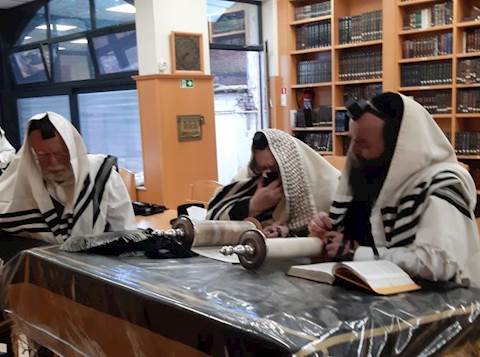The fact that the approximately 20,000 members of the frum kehilla in Antwerp live in close proximity to each other caused dire predictions of a high death rate at the start of the coronavirus crisis, the Jewish Telegraphic Agency (JTA) reported.
Members of the Jewish community warned in March that 85% of its members would contract the coronavirus and there would over 500 fatalities due to the Jews’ close proximity to each other and the community’s many religious events. The homes of the frum community are situated on about 20 narrow streets near Antwerp’s main train station.
Yet, despite Belgium suffering the world’s highest per capita coronavirus death rate, the frum kehilla – unlike many frum communities in other countries that suffered a disproportionately high rate of infection compared to the general public – has fared relatively well.
Jewish community leaders told JTA that there have been eleven coronavirus fatalities in the community – all of them elderly or suffering from underlying medical conditions.
Community members attribute the low death rate to the fact that Rabbanim of the community responded to the crisis with responsible leadership and community members strictly adhered to their instructions.
“We are blessed in that we have rabbis that gave clear instructions and community members who listened,” said Shlomo Stroh, a 38-year-old community activist and father of seven children.
However, not everything was so rosy at the beginning, with some members of the community ignoring government instructions to refrain from group tefillos. Shmulie Markowitz, head of the Antwerp Hatzolah unit sent a Whatsapp message to Antwerp Jews in March pleading with them to adhere to health regulations prohibiting over 10 people in a store at a time.
“People push in, and they bring their children with them, and this must stop,” Markowitz wrote.
However, the frum community eventually absorbed the seriousness of the situation and its Rabbanim took decisive action, closing all shuls on March 13 – five days before the Belgian government imposed a national lockdown.
“It’s just a few days, but with a pandemic that grows exponentially it was a crucial early step,” Stroh told JTA.
Stroh said he was involved in the decision, which was made by Rav Aharon Schiff, the Mara de’Asra of Machzikei Hadas and the Av Beis Din of the Antwerp Beis Din.
However, according to Claude Marinower, an Antwerp alderman (member of the city council), the frum community’s adherence to the rules was a “gradual process.”
“At first there was some pushback from some community members against the closure of synagogues,” Marinower, who is Jewish but is not Orthodox, told JTA. But “there was more cooperation as the dimensions of the pandemic emerged — and especially in Belgium, where about 10,000 people have died of the coronavirus.”
“When rabbis issued strong instructions against gatherings, it was accepted by all,” Marinower said.
Shuls re-opened in Belgium a week ago, on June 8.
(YWN Israel Desk – Jerusalem)










